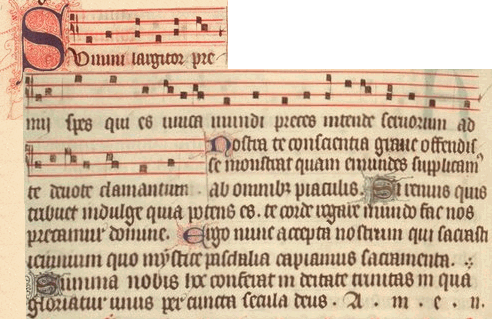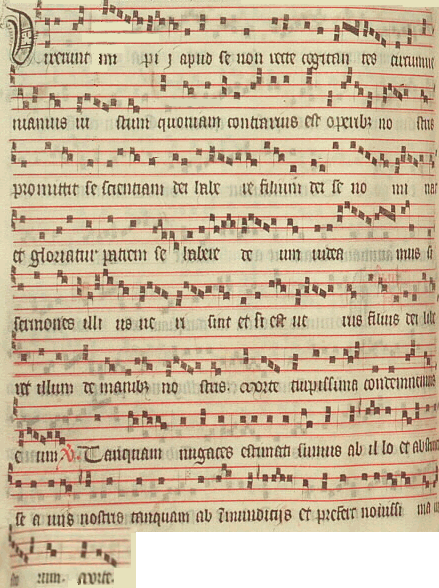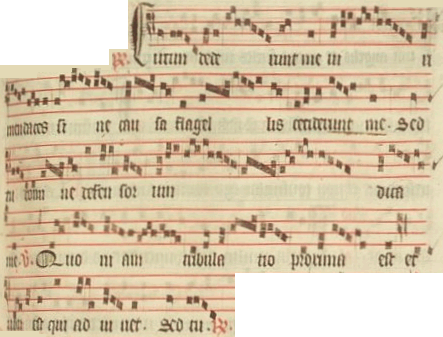READINGS: LENT FRIDAY I
שׁוּבוּ אֶל־יְהוָה אֱלֹהֵיכֶם —
כִּי־חַנּוּן וְרַחוּם הוּא Even Years: Exodus 12:21-36
וַיִּקְרָא
מֹשֶׁה
לְכָל־זִקְנֵי
יִשְׂרָאֵל
וַיֹּאמֶר
אֲלֵהֶם
מִשְׁכוּ
וּקְחוּ
לָכֶם צֹאן לְמִשְׁפְּחֹתֵיכֶם
וְשַׁחֲטוּ
הַפָּסַח׃ וּלְקַחְתֶּם
אֲגֻדַּת
אֵזוֹב
וּטְבַלְתֶּם
בַּדָּם
אֲשֶׁר־בַּסַּף
וְהִגַּעְתֶּם
אֶל־הַמַּשְׁקוֹף
וְאֶל־שְׁתֵּי
הַמְּזוּזֹת
מִן־הַדָּם
אֲשֶׁר
בַּסָּף
וְאַתֶּם לֹא
תֵצְאוּ
אִישׁ מִפֶּתַח־בֵּיתוֹ
עַד־בֹּקֶר׃ וְעָבַר
יְהוָה
לִנְגֹּף
אֶת־מִצְרַיִם
וְרָאָה
אֶת־הַדָּם
עַל־הַמַּשְׁקוֹף
וְעַל
שְׁתֵּי
הַמְּזוּזֹת
וּפָסַח
יְהוָה עַל־הַפֶּתַח
וְלֹא יִתֵּן
הַמַּשְׁחִית
לָבֹא
אֶל־בָּתֵּיכֶם
לִנְגֹּף׃ וּשְׁמַרְתֶּם
אֶת־הַדָּבָר
הַזֶּה לְחָק־לְךָ
וּלְבָנֶיךָ
עַד־עוֹלָם׃
וְהָיָה
כִּי־תָבֹאוּ
אֶל־הָאָרֶץ
אֲשֶׁר
יִתֵּן
יְהוָה לָכֶם
כַּאֲשֶׁר
דִּבֵּר וּשְׁמַרְתֶּם
אֶת־הָעֲבֹדָה
הַזֹּאת׃ וְהָיָה
כִּי־יֹאמְרוּ
אֲלֵיכֶם
בְּנֵיכֶם
מָה
הָעֲבֹדָה
הַזֹּאת
לָכֶם׃ וַאֲמַרְתֶּם
זֶבַח־פֶּסַח
הוּא לַיהוָה אֲשֶׁר
פָּסַח
עַל־בָּתֵּי
בְנֵי־יִשְׂרָאֵל
בְּמִצְרַיִם
בְּנָגְפּוֹ
אֶת־מִצְרַיִם
וְאֶת־בָּתֵּינוּ
הִצִּיל
וַיִּקֹּד
הָעָם
וַיִּשְׁתַּחֲוּוּ׃ וַיֵּלְכוּ
וַיַּעֲשׂוּ
בְּנֵי
יִשְׂרָאֵל
כַּאֲשֶׁר
צִוָּה יְהוָה
אֶת־מֹשֶׁה
וְאַהֲרֹן
כֵּן עָשׂוּ׃
וַיְהִי
בַּחֲצִי
הַלַּיְלָה
וַיהוָה הִכָּה
כָל־בְּכוֹר
בְּאֶרֶץ
מִצְרַיִם
מִבְּכֹר
פַּרְעֹה
הַיֹּשֵׁב
עַל־כִּסְאוֹ
עַד בְּכוֹר
הַשְּׁבִי
אֲשֶׁר
בְּבֵית
הַבּוֹר
וְכֹל
בְּכוֹר
בְּהֵמָה׃ וַיָּקָם
פַּרְעֹה
לַיְלָה הוּא
וְכָל־עֲבָדָיו
וְכָל־מִצְרַיִם
וַתְּהִי
צְעָקָה
גְדֹלָה
בְּמִצְרָיִם
כִּי־אֵין
בַּיִת
אֲשֶׁר
אֵין־שָׁם
מֵת׃
וַיִּקְרָא
לְמֹשֶׁה
וּלְאַהֲרֹן
לַיְלָה
וַיֹּאמֶר
קוּמוּ
צְּאוּ
מִתּוֹךְ
עַמִּי
גַּם־אַתֶּם
גַּם־בְּנֵי
יִשְׂרָאֵל
וּלְכוּ
עִבְדוּ
אֶת־יְהוָה
כְּדַבֶּרְכֶם׃ גַּם־צֹאנְכֶם
גַּם־בְּקַרְכֶם
קְחוּ כַּאֲשֶׁר
דִּבַּרְתֶּם
וָלֵכוּ
וּבֵרַכְתֶּם
גַּם־אֹתִי׃ וַתֶּחֱזַק
מִצְרַיִם
עַל־הָעָם
לְמַהֵר לְשַׁלְּחָם
מִן־הָאָרֶץ
כִּי אָמְרוּ
כֻּלָּנוּ
מֵתִים׃
וַיִּשָּׂא
הָעָם
אֶת־בְּצֵקוֹ
טֶרֶם יֶחְמָץ
מִשְׁאֲרֹתָם
צְרֻרֹת
בְּשִׂמְלֹתָם
עַל־שִׁכְמָם׃ וּבְנֵי־יִשְׂרָאֵל
עָשׂוּ
כִּדְבַר מֹשֶׁה
וַיִּשְׁאֲלוּ
מִמִּצְרַיִם
כְּלֵי־כֶסֶף
וּכְלֵי
זָהָב
וּשְׂמָלֹת׃ וַיהוָה
נָתַן
אֶת־חֵן
הָעָם
בְּעֵינֵי מִצְרַיִם
וַיַּשְׁאִלוּם
וַיְנַצְּלוּ
אֶת־מִצְרָיִם׃
25 and when you have entered the country which Yahweh will give you, as he has promised, you will observe this ritual. 26 And when your children ask you, "What does this ritual mean?" 27 you will tell them, "It is the Passover sacrifice in honour of Yahweh who passed over the houses of the Israelites in Egypt, and struck Egypt but spared our houses." And the people bowed in worship. 28 The Israelites then went away and did as Yahweh had ordered Moses and Aaron.
29 And at midnight Yahweh struck down all the first-born in Egypt from the first-born of Pharaoh, heir to his throne, to the first-born of the prisoner in the dungeon, and the first-born of all the livestock. 30 Pharaoh and all his officials and all the Egyptians got up in the night, and there was great wailing in Egypt, for there was not a house without its dead.
31 It was still dark when Pharaoh summoned Moses and Aaron and said, 'Up, leave my subjects, you and the Israelites! Go and worship Yahweh as you have asked! 32 And take your flocks and herds as you have asked, and go! And bless me too!' 33 The Egyptians urged the people on and hurried them out of the country because, they said, 'Otherwise we shall all be dead.'
34 So the people carried off their dough still unleavened, their bowls wrapped in their cloaks, on their shoulders. 35 The Israelites did as Moses had told them and asked the Egyptians for silver and golden jewellery, and clothing. 36 Yahweh made the Egyptians so much impressed with the people that they gave them what they asked. So they despoiled the Egyptians.
Odd Years: Deuteronomy 15:1-18
1 מִקֵּץ
שֶׁבַע־שָׁנִים
תַּעֲשֶׂה
שְׁמִטָּה׃
4 There must, then, be no poor among you. For Yahweh will grant you his blessing in the country which Yahweh your God is giving you to possess as your heritage, 5 only if you pay careful attention to the voice of Yahweh your God, by keeping and practising all these commandments which I am enjoining on you today. 6 If Yahweh your God blesses you as he has promised, you will be creditors to many nations but debtors to none; you will rule over many nations, and be ruled by none.
7 Is there anyone poor among you, one of your brothers, in any town of yours in the country which Yahweh your God is giving you? Do not harden your heart or close your hand against that poor brother of yours, 8 but be open handed with him and lend him enough for his needs. 9 Do not allow this mean thought in your heart, "The seventh year, the year of remission, is near," and scowl at your poor brother and give him nothing; he could appeal against you to Yahweh, and you would incur guilt! 10 When you give to him, you must give with an open heart; for this, Yahweh your God will bless you in all your actions and in all your undertakings. 11 Of course, there will never cease to be poor people in the country, and that is why I am giving you this command: Always be open handed with your brother, and with anyone in your country who is in need and poor.
12 If your fellow Hebrew, man or woman, sells himself to you, he can serve you for six years. In the seventh year you must set him free, 13 and in setting him free you must not let him go empty handed. 14 By way of present, you will load his shoulders with things from your flock, from your threshing-floor and from your winepress; as Yahweh your God has blessed you, so you must give to him. 15 Remember that you were once a slave in Egypt and that Yahweh your God redeemed you; that is why I am giving you this order today.
16 But if he says to you, "I do not want to leave you," because he loves you and your household and is happy with you, 17 you must take an awl and drive it through his ear into the door and he will be your servant for ever. You must do the same to a female slave.
18 Do not think it hard on you to have to give him his freedom; he is worth twice what a paid servant would cost you, and has served you for six years. And Yahweh your God will bless you in everything you do.
Even Years: Aelred of Rievaulx, Speculum caritatis, Lib 3:5 (PL 195, 582)
Odd Years: Asterius de Amasea, Homily 13 (PG 40, 355-358,362)

Invitatory Psalm & BACK

PSALMS and BACK
21 Moses summoned all the elders of Israel and said to them, 'Go and choose a lamb or kid for your families, and kill the Passover victim. 22 Then take a bunch of hyssop, dip it in the blood that is in the basin, and with the blood from the basin touch the lintel and both door-posts; then let none of you venture out of the house till morning. 23 Then, when Yahweh goes through Egypt to strike it, and sees the blood on the lintel and on both door-posts, he will pass over the door and not allow the Destroyer to enter your homes and strike. 24 You will observe this as a decree binding you and your children for all time,
2 וְזֶה
דְּבַר
הַשְּׁמִטָּה
שָׁמוֹט
כָּל־בַּעַל
מַשֵּׁה
יָדוֹ אֲשֶׁר
יַשֶּׁה
בְּרֵעֵהוּ
לֹא־יִגֹּשׂ
אֶת־רֵעֵהוּ
וְאֶת־אָחִיו
כִּי־קָרָא
שְׁמִטָּה
לַיהוָה׃
3 אֶת־הַנָּכְרִי
תִּגֹּשׂ
וַאֲשֶׁר
יִהְיֶה לְךָ
אֶת־אָחִיךָ
תַּשְׁמֵט
יָדֶךָ׃
4 אֶפֶס
כִּי לֹא
יִהְיֶה־בְּךָ
אֶבְיוֹן
כִּי־בָרֵךְ
יְבָרֶכְךָ
יְהוָה בָּאָרֶץ
אֲשֶׁר
יְהוָה
אֱלֹהֶיךָ
נֹתֵן־לְךָ
נַחֲלָה
לְרִשְׁתָּהּ׃
5 רַק
אִם־שָׁמוֹעַ
תִּשְׁמַע
בְּקוֹל יְהוָה
אֱלֹהֶיךָ
לִשְׁמֹר
לַעֲשׂוֹת
אֶת־כָּל־הַמִּצְוָה
הַזֹּאת
אֲשֶׁר
אָנֹכִי מְצַוְּךָ
הַיּוֹם׃
6 כִּי־יְהוָה
אֱלֹהֶיךָ
בֵּרַכְךָ
כַּאֲשֶׁר
דִּבֶּר־לָךְ
וְהַעֲבַטְתָּ
גּוֹיִם
רַבִּים
וְאַתָּה לֹא
תַעֲבֹט
וּמָשַׁלְתָּ
בְּגוֹיִם
רַבִּים
וּבְךָ לֹא
יִמְשֹׁלוּ׃
ס
7 כִּי־יִהְיֶה
בְךָ
אֶבְיוֹן
מֵאַחַד אַחֶיךָ
בְּאַחַד
שְׁעָרֶיךָ
בְּאַרְצְךָ
אֲשֶׁר־יְהוָה
אֱלֹהֶיךָ
נֹתֵן לָךְ
לֹא תְאַמֵּץ
אֶת־לְבָבְךָ
וְלֹא
תִקְפֹּץ
אֶת־יָדְךָ
מֵאָחִיךָ
הָאֶבְיוֹן׃
8 כִּי־פָתֹחַ
תִּפְתַּח
אֶת־יָדְךָ
לוֹ וְהַעֲבֵט
תַּעֲבִיטֶנּוּ
דֵּי
מַחְסֹרוֹ אֲשֶׁר
יֶחְסַר לוֹ׃
9 הִשָּׁמֶר
לְךָ
פֶּן־יִהְיֶה
דָבָר עִם־לְבָבְךָ
בְלִיַּעַל
לֵאמֹר
קָרְבָה
שְׁנַת־הַשֶּׁבַע
שְׁנַת
הַשְּׁמִטָּה
וְרָעָה עֵינְךָ
בְּאָחִיךָ
הָאֶבְיוֹן
וְלֹא תִתֵּן
לוֹ וְקָרָא
עָלֶיךָ
אֶל־יְהוָה
וְהָיָה בְךָ
חֵטְא׃
10 נָתוֹן
תִּתֵּן לוֹ
וְלֹא־יֵרַע
לְבָבְךָ בְּתִתְּךָ
לוֹ כִּי
בִּגְלַל
הַדָּבָר הַזֶּה
יְבָרֶכְךָ
יְהוָה
אֱלֹהֶיךָ
בְּכָל־מַעֲשֶׂךָ
וּבְכֹל
מִשְׁלַח
יָדֶךָ׃
11 כִּי
לֹא־יֶחְדַּל
אֶבְיוֹן
מִקֶּרֶב הָאָרֶץ
עַל־כֵּן
אָנֹכִי
מְצַוְּךָ
לֵאמֹר פָּתֹחַ
תִּפְתַּח
אֶת־יָדְךָ
לְאָחִיךָ לַעֲנִיֶּךָ
וּלְאֶבְיֹנְךָ
בְּאַרְצֶךָ׃
ס
12 כִּי־יִמָּכֵר
לְךָ אָחִיךָ
הָעִבְרִי אוֹ
הָעִבְרִיָּה
וַעֲבָדְךָ
שֵׁשׁ
שָׁנִים
וּבַשָּׁנָה
הַשְּׁבִיעִת
תְּשַׁלְּחֶנּוּ
חָפְשִׁי
מֵעִמָּךְ׃
13 וְכִי־תְשַׁלְּחֶנּוּ
חָפְשִׁי
מֵעִמָּךְ
לֹא
תְשַׁלְּחֶנּוּ
רֵיקָם׃
14 הַעֲנֵיק
תַּעֲנִיק
לוֹ
מִצֹּאנְךָ
וּמִגָּרְנְךָ
וּמִיִּקְבֶךָ
אֲשֶׁר
בֵּרַכְךָ
יְהוָה
אֱלֹהֶיךָ
תִּתֶּן־לוֹ׃
15 וְזָכַרְתָּ
כִּי עֶבֶד
הָיִיתָ
בְּאֶרֶץ מִצְרַיִם
וַיִּפְדְּךָ
יְהוָה
אֱלֹהֶיךָ
עַל־כֵּן
אָנֹכִי
מְצַוְּךָ
אֶת־הַדָּבָר
הַזֶּה
הַיּוֹם׃
16 וְהָיָה
כִּי־יֹאמַר
אֵלֶיךָ לֹא
אֵצֵא מֵעִמָּךְ
כִּי
אֲהֵבְךָ
וְאֶת־בֵּיתֶךָ
כִּי־טוֹב
לוֹ עִמָּךְ׃
17 וְלָקַחְתָּ
אֶת־הַמַּרְצֵעַ
וְנָתַתָּה בְאָזְנוֹ
וּבַדֶּלֶת
וְהָיָה לְךָ
עֶבֶד עוֹלָם
וְאַף
לַאֲמָתְךָ
תַּעֲשֶׂה־כֵּן׃
18 לֹא־יִקְשֶׁה
בְעֵינֶךָ
בְּשַׁלֵּחֲךָ
אֹתוֹ
חָפְשִׁי
מֵעִמָּךְ
כִּי
מִשְׁנֶה שְׂכַר
שָׂכִיר
עֲבָדְךָ
שֵׁשׁ
שָׁנִים וּבֵרַכְךָ
יְהוָה אֱלֹהֶיךָ
בְּכֹל
אֲשֶׁר
תַּעֲשֶׂה׃
1 At the end of every seven years, you must grant remission. 2 The nature of the remission is as follows: any creditor holding a personal pledge obtained from his fellow must release him from it; he must not exploit his fellow or his brother once the latter has appealed to Yahweh for remission. 3 A foreigner you may exploit, but you must remit whatever claim you have on your brother.
Ad inimicorum dilectionem, in qua fraternae caritatis consistit perfectio, nihil nos ita animat, ut illius mirae patientiae grata consideratio, qua ille, speciosus forma prae filiis hominum, venustam faciem suam impiis praebuit conspuendam; qua oculos illos, quorum nutu reguntur omnia, velamini subdidit iniquorum; qua latera illa sua flagellis exposuit; qua caput, tremendum principatibus et potestatibus, spinarum asperitati submisit; qua semetipsum opprobriis ac contumeliis addixit; qua tandem crucem, clavos, lanceam, fel, acetum patienter sustinuit, in omnibus lenis, mitis, tranquillus.
We can find no greater inspiration to love even our enemies as brothers - as we must if our love is to be perfect - than grateful remembrance of Christ's wonderful patience. He who was the fairest of the children of men offered his beautiful face to be spat upon by sinners; he allowed those eyes whose glance rules the universe to be blindfolded by wicked men; he bared his back to the scourges; he submitted that head which strikes terror into principalities and powers to the sharpness of thorns; he gave himself up to be mocked and reviled, and at the end endured the Cross, the nails, the lance, the gall, the vinegar, while remaining always gentle, kindly, and serene.
Denique tamquam ovis ad occisionem ductus est, et quasi agnus coram tondente se obmutuit, et non aperuit os suum.
In short, he was led like a sheep to the slaughter, and like a lamb before the shearers he was silent, not opening his mouth.
Quis illam audiens mirabilem vocem, plenam dulcedinis, plenam caritatis, plenam immutabilis tranquillitatis: Pater, ignosce illis, non statim omni affectu suos amplecitur inimicos? Pater, inquit, ignosce illis. Quid lenitatis, quid caritatis huic addi potuit orationi?
Who could listen to that wonderful prayer, so full of affection, love and imperturbable calm - Father, forgive them - and not at once embrace his enemies with all his love? Father, he says, forgive them. Could any prayer be more full of gentleness and love?
Addidit tamen; parum fuit orare, voluit et excusare. Pater, inquit, ignosce illis, non enim sciunt quid faciunt. Sunt quidem magni peccatores, sed pusilli aestimatores; ideo: Pater, ignosce illis. Crucifigunt; quem tamen crucifigant nesciunt, quia, si cognivissent, numquam Dominum gloriae crucifixissent; ideo: Pater ignosce illis. Putant legis praevaricatorem, putant divinitatis praesumptorem, putant populi seductorem. Abscondi ab eis faciem meam, non agnoverunt maiestatem meam; ideo: Pater, ignosce illis, quia nesciunt quid faciunt.
Yet he added something more. It was not enough to pray for them: he wished also to excuse them. Father, forgive them, for they do not know what they are doing. They are great sinners, yes, but they have little understanding. Therefore, Father, forgive them. They are nailing me to the Cross, but they do not know who it is they are nailing to the Cross. If they had known, they would never have crucified the Lord of glory. Therefore, Father, forgive them. They think it is a lawbreaker, an impostor claiming to be God, a seducer of the people. I have hidden my face from them, and they do not recognize my glory. Therefore, Father, forgive them, for they do not know what they are doing.
Igitur, ut homo se diligat, nulla se carnis delectatione corrumpat. Ut vero carnali concupiscentiae non succumbat, omnem affectum suum ad suavitatem dominicae carnis extendat. Porro, ut perfectius ac suavius in fraternae caritatis delectatione quiescat, etiam inimicos bracchiis veri amoris astringat.
[Therefore, if we are to love ourselves, let us not corrupt ourselves by pleasure of the flesh. To avoid succumbing to concupiscence of the flesh, let us turn all our love to the goodness of the Lord's body.] If we wish to experience fully the joy of loving our brothers, we must embrace with real love even our enemies.
Sed, ne divinus hic ignis iniuriarum statu tepescat, dilecti Domini ac Salvatoris sui tranquillam patientiam oculis mentis semper aspiciat.
To prevent this fire of divine love from being cooled by the injuries we receive, let us keep the eyes of our soul always fixed on the serene patience of our beloved Lord and Saviour.
Εἰ ζηλοῦτε Θεὸν
ὡς κατ' εἰκόνα κτισθέντες,
μιμήσασθε ὑμῶν
τὸν ἀρχέτυπον·
ὦ χριστιανοί, τὸ
φιλάνθρωπον ὄνομα,
ζηλώσατε τοῦ Χριστοῦ
τὴν ἀγάπην.
You were made in the image of God. If then you wish to resemble him, follow his example. Since the very name you bear as Christians is a profession of love for men, imitate the love of Christ.
ἀποβλέψατε πρὸς
τὸν πλοῦτον τῆς
ἐκείνου φιλανθρωπίας.
Μέλλων γὰρ ἀνθρώποις
ἐπιφαίνεσθαι δι'
ἀνθρώπου προκαθῆκε
τὸν Ἰωάννην, μετανοίας
κήρυκα, μεταμελείας
εἰσηγητὴν καὶ πάντας
πρὸ Ἰωάννου προφήτας
ἐπιστροφῆς διδασκάλους.
Reflect for a moment on the wealth of his kindness. Before he came as a man to be among men, he sent John the Baptist to preach repentance and lead men to practice it. John himself was preceded by the prophets, who were to teach the people to repent, to return to God and to amend their lives.
Εἶτα καὶ αὐτὸς
μετ' ὀλίγον ἐπιφανεὶς
οἰκείᾳ φωνῇ βοᾷ
αὐτοπροσώπως·
Δεῦτε πρὸς μέ, πάντες
οἱ κοπιῶντες καὶ
πεφορτισμένοι,
κἀγὼ ἀναπαύσω ὑμᾶς.
Τοὺς δὲ τῇ κλήσει
πεισθέντας πῶς
ὑπεδέξατο; Ἄπονον
ἔδωκεν τῶν ἁμαρτημάτων
τὴν ἄφεσιν, ἀκαριαίαν
καὶ σύντομον τὴν
τῶν λυπούντων ἀπαλλαγήν·
Λόγος ἡγίασεν, Πνεῦμα
ἐσφράγισεν· ὁ παλαιὸς
ἄνθρωπος ἐνετάφη
τῷ ὕδατι, ὁ νέος
ἐτέχθη ἀνηβήσας
τῇ χάριτι. Τί τὰ
ἑξῆς; Ὁ ἄνθρωπος
οἰκεῖος ἀντ' ἀλλοτρίου,
υἱὸς ἀντὶ ξένου,
μύστης ἐκ βεβήλου,
ἅγιος ἐξ ἀσεβῶν
Then Christ came himself, and with his own lips cried out: Come to me, all you who labor and are overburdened, and I will give you rest. How did he receive those who listened to his call? He readily forgave them their sins; he fred them instantly from all that troubled them. The Word made them holy; the Spirit set his seal on them. The old Adam was buried in the waters of baptism; the new man was reborn to the vigor of grace. What was the result? [The foreigner became a citizen, the visitor became a son, the untouchable became an initiate.]
Μιμησώμεθα τὴν
ποιμαντικὴν τοῦ
Δεσπότου· ἐγκύψωμεν
τοῖς εὐαγγελίοις
καὶ ὥσπερ ἐν ἐσόπτρῳ
τὴν ἰδέαν καταμάθωμεν
τῆς ἐπιμελείας
τε καὶ χρηστότητος.
Let us then be shepherds like the Lord. We must meditate on the Gospel, and as we see in this mirror the example of zeal and loving kindness, we should become thoroughly schooled in these virtues.
Βλέπω γὰρ ἐκεῖ
ἐν παραβολαῖς καὶ
τοῖς ἐπεσκιασμένοις
τῶν λόγων ἄνδρα
ποιμένα ἑκατὸν
προβάτων· ὃς ἑνὸς
θρέμματος ἀποσχισθέντος
τῆς ἀγέλης καὶ πλανωμένου
οὐ τοῖς ἐν τάξει
καὶ ἀπλανῶς νενομένοις
παρέμεινεν, ἀλλ'
ὁρμήσας ἐπὶ τὴν
ζήτησιν πολλὰς
μὲν διώδευσε κοιλότητας
τε καὶ φάραγγας,
μεγάλων δὲ καὶ ὑψηλῶν
ὑπερηνέχθη σκοπέλων
καὶ ταῖς ἐρημίαις
καρτερῶς ἐνεμόχθησε,
μέχρις ἀνίχνευσε
τὸ πλανώμενον.
For there, obscurely, in the form of a parable, we see a shepherd who had a hundred sheep. When one of them was separated from the flock and lost its way, that shepherd did not remain with the sheep who kept together at pasture. No, he went off to look for the stray. He crossed many valleysand thickets, he climbed great and towering mountains, he spent much time and labor in wandering through solitary places until at last he found his sheep.
Εὑρὼν δὲ οὐκ
ἔπληξεν, οὐ μὴν οὐδὲ
ἤλασεν σφοδρῶς
ἐπείγων πρὸς τὴν
ἀγέλην, ἀλλ' ἐπιθεὶς
τῷ αὐχένι καὶ κομίσας
μετὰ φειδοῦς τοῖς
συννόμοις ἀποκατέστησεν
χαίρων ἐπ' ἐκείνῳ
πλέον ἢ τῷ πλήθει
τῶν ἄλλων. Νοήσωμεν
τοίνυν τὸ πρᾶγμα
τὸ τοῖς αἰνίγμασιν
ἐγκρυπτόμενον.
Τὸ γὰρ πρόβατον
οὐκ ὄντως πρόβατον
καὶ ὁ ποιμὴν δὲ
πάντως ἄλλο τι, οὐ
μὴν ὁ τῶν ἀλόγων
νομεύς, ἀλλ' ἔστιν
ὑποδείγματα ταῦτα
τῶν ἱερέων παιδευτικά,
ἵνα τῶν ἀνθρώπων
μήτε προχείρως
ἀπελπίζωμεν μήτε
καταρρᾳθυμῶμεν
κινδυνευόντων.
Ζητῶμεν δὲ τὸν ἐμπαθῆ
καὶ ἐπανάγωμεν
εἰς τάξιν καὶ χαίρωμεν
τοῖς ἐπιστρέφουσιν
καὶ τῷ πληρώματι
τῶν ὀρθῶς βιούντων
ἀναμιγνύωμεν.
When he found it, he did not chastise it; he did not use rough blows to drive it back, but gently placed it on his own shoulders and carried it back to the flock. He took greater joy in this one sheep, lost and found, than in all the others. Let us look more closely at the hidden meaning of this parable. The sheep is more than a sheep, the shepherd more than a shepherd. They are examples enshrining holy truths. They teach us that we should not look on men as lost or beyond hope; we should not abandon them when they are in danger or be slow to come to their help. When they turn away from the right path an wander, we must lead them back, and rejoice at their return, welcoming them back into the company of those who lead good and holy lives.
Prayer

